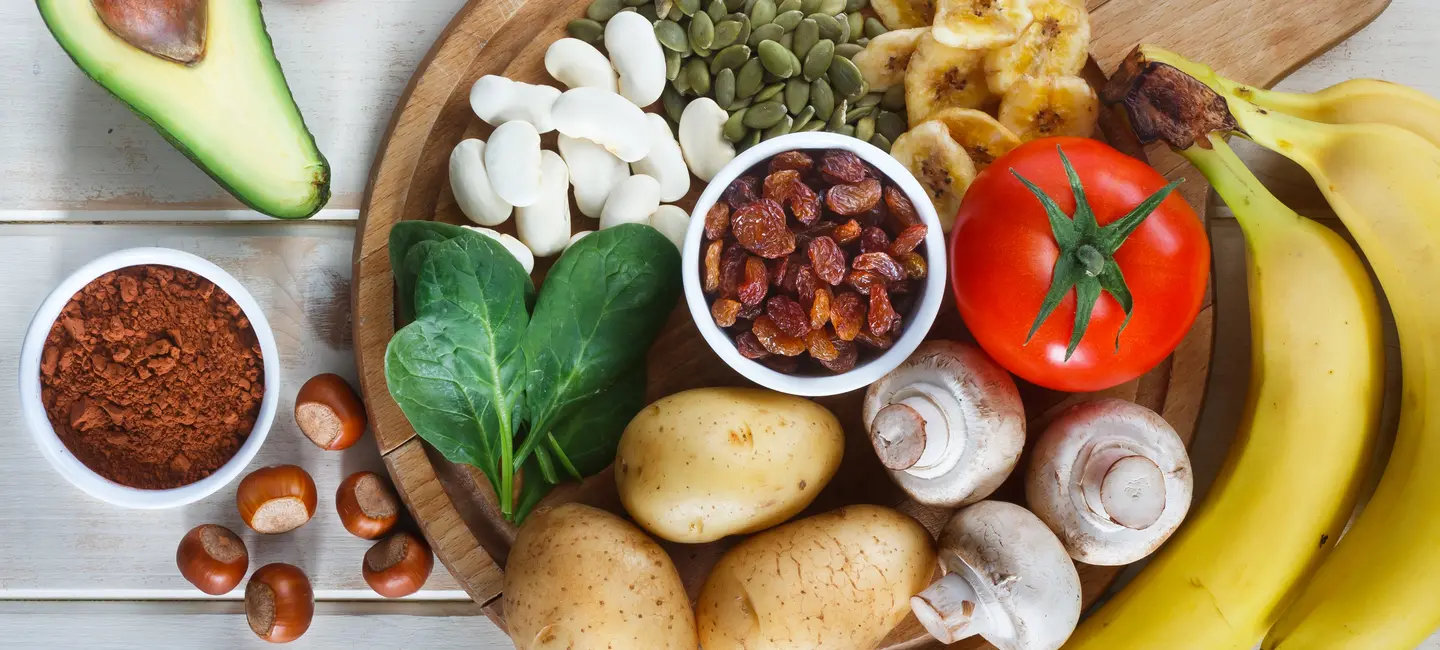
Potassium is a mineral that is important for many body functions. Food sources include fruits, cereals, beans, milk, and vegetables.
Potassium plays a role in the transmission of nerve signals, muscle contractions, fluid balance, and various chemical reactions.
Potassium is most commonly used for treating and preventing low potassium levels, treating high blood pressure, and preventing stroke. It's also used for prediabetes and many other conditions, but there's no good scientific evidence to support these other uses.
Is It Effective?
NatMed Pro rates effectiveness based on scientific evidence according to the following scale: Effective, Likely Effective, Possibly Effective, Possibly Ineffective, Likely Ineffective, Ineffective, and Insufficient Evidence to Rate.
- Low levels of potassium in the blood (hypokalemia). Taking potassium by mouth or by IV prevents and treats low levels of potassium in the blood. IV products can only be given by a healthcare provider.
- High blood pressure. Taking potassium can lower blood pressure. Potassium seems to work best for people with high blood pressure, low potassium levels, and high sodium intake. People with high blood pressure should aim to eat foods that provide 3500-5000 mg of potassium daily. This intake of potassium is expected to lower blood pressure by about 4-5 mmHg in people with high blood pressure.
- Kidney stones. Taking potassium citrate can help prevent kidney stones from reoccurring. However, this medication should be prescribed by a healthcare professional. It is unclear whether supplementation with potassium citrate is helpful.
- Heart disease. Higher intake of potassium from food has been linked to a 13% reduced risk of heart disease when compared with lower intake of potassium from food. But it's not clear if taking potassium supplements by mouth has the same benefit.
- Stroke. Higher intake of potassium from food has been linked to up to a 20% reduced risk of stroke. But it's not clear if taking potassium supplements by mouth has the same benefit.
There is interest in using potassium for a number of other purposes, but there isn't enough reliable information to say whether it might be helpful.
Is it Safe?
When taken by mouth: Potassium is likely safe for most people when taken by mouth in amounts of up to 100 mEq (3900 mg) of total potassium daily. In some people, potassium can cause stomach upset, nausea, diarrhea, vomiting, or intestinal gas.
Special Precautions & Warnings:
Pregnancy and breast-feeding: Potassium is likely safe to consume in amounts typically found in the diet when pregnant or breast-feeding.
Children: Potassium is likely safe in children when consumed in amounts typically found in the diet.
Disorders of the digestive tract that might alter the speed food and supplements pass through the body (GI motility conditions): If you have one of these disorders, do not take potassium supplements. Potassium could build up to dangerous levels in the body.
Kidney disease: Kidneys that don't work well have trouble keeping a balanced amount of potassium in the body. If you have a kidney condition, use potassium supplements only with the advice and ongoing care of a healthcare professional.
Medications for high blood pressure (ACE inhibitors)
Interaction Rating=Moderate Be cautious with this combination.
Some medications for high blood pressure can increase potassium levels. Taking potassium supplements along with some medications for high blood pressure might cause too much potassium in the body. But eating food containing moderate amounts of potassium along with these medications does not seem to increase potassium levels.
Medications for high blood pressure (Angiotensin receptor blockers (ARBs))
Interaction Rating=Moderate Be cautious with this combination.
Some medications for high blood pressure can increase potassium levels. Taking potassium supplements along with some medications for high blood pressure might cause too much potassium in the body. But eating food containing moderate amounts of potassium along with these medications does not seem to increase potassium levels.
Water pills (Potassium-sparing diuretics)
Interaction Rating=Moderate Be cautious with this combination.
Some "water pills" can increase potassium levels in the body. Taking some "water pills" along with potassium might cause too much potassium in the body. But eating food containing moderate amounts of potassium along with these medications does not seem to increase potassium levels.
There are no known interactions with herbs and supplements.
Some salt substitutes contain high amounts of potassium. Keep this in mind if you have kidney disease or are taking certain drugs, such as ACE inhibitors or potassium-sparing diuretics. Using salt substitutes along with potassium supplements might increase potassium levels too much.
Potassium is found in many foods, including fruits, cereals, beans, milk, and vegetables. It's recommended that adult females consume 2.6 grams daily, and adult males consume 3.4 grams daily to maintain adequate nutrition. When pregnant, 2.9 grams should be consumed daily, and when breastfeeding, 2.8 grams should be consumed daily. Recommended amounts for children depend on age. Speak with a healthcare provider to find out what dose might be best for a specific condition.
Acétate de Potassium, Atomic number 19, Bicarbonate de Potassium, Chelated Potassium, Chlorure de Potassium, Citrate de Potassium, Gluconate de Potassium, Glycérophosphate de Potassium, K, Numéro Atomique 19, Orotate de Potassium, Phosphate de Potassium, Potasio, Potassium Acetate, Potassium Bicarbonate, Potassium Chelate, Potassium Chloride, Potassium Citrate, Potassium Gluconate, Potassium Glycerophosphate, Potassium Hydroxide, Potassium Orotate, Potassium Phosphate, Potassium Sulfate, Sulfate de Potassium.
Information on this website is for informational use only and is not intended to replace professional medical advice, diagnosis, or treatment. While evidence-based, it is not guaranteed to be error-free and is not intended to meet any particular user’s needs or requirements or to cover all possible uses, safety concerns, interactions, outcomes, or adverse effects. Always check with your doctor or other medical professional before making healthcare decisions (including taking any medication) and do not delay or disregard seeking medical advice or treatment based on any information displayed on this website.
© TRC Healthcare 2024. All rights reserved. Use and/or distribution is permitted only pursuant to a valid license or other permission from TRC Healthcare.
